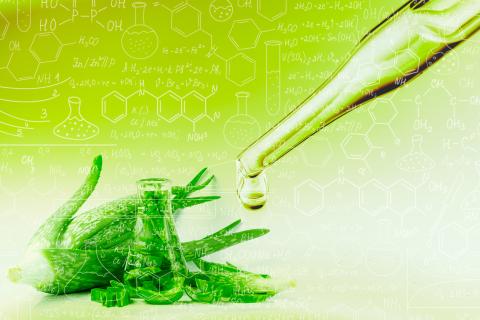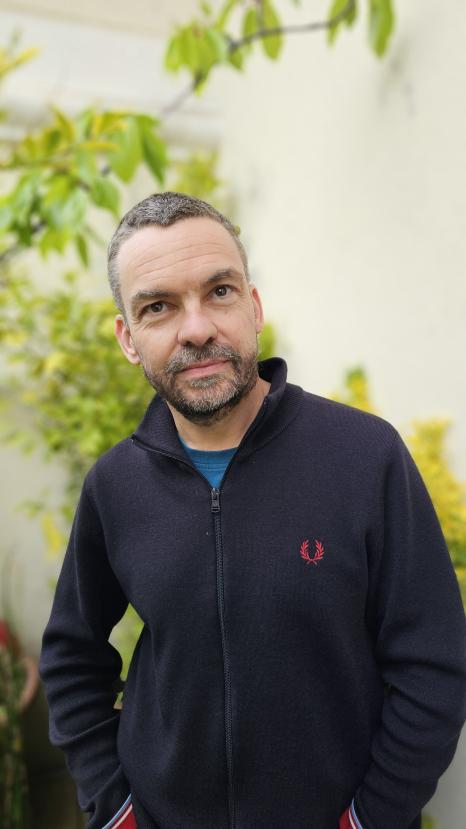
Erwan Poupon: exploring and teaching the evolutionary chemistry of natural substances
Erwan Poupon is a professor and researcher in the Chemistry of Natural Substances team of the Biomolecules: Design, Isolation, Synthesis laboratory (BioCIS - Univ. Paris-Saclay/Cergy Paris Université/National Centre for Scientific Research, CNRS). Winner of the Minafin 2023 prize from the French Academy of Sciences, he specialises in the chemistry of natural substances, particularly their molecular complexity and evolutionary aspect, as sources of active ingredients in pharmaceuticals.
Erwan Poupon's passion for the natural sciences and chemistry led him to study pharmacy at the University of Rennes in 1989. He chose an industrial career path and completed his final internship at Rhône-Poulenc (now Sanofi), where he discovered industrial research, an experience that captivated him. This convinced him to continue his studies in chemistry, enrolling in a DEA (now a 2nd year Master’s degree) at the Université Paris Descartes (now Université Paris Cité) in 1996.
Specialising in the chemistry of natural substances
Erwan Poupon remained at the same university to write his thesis, which he defended in 2000. During this time, he specialised in the chemistry of natural substances and studied molecules derived from biodiversity. He explored the chemical mechanisms underlying the biosynthesis of natural substances in plants and insects. These substances are essential for the environmental adaptation of these living organisms, serving as means of communication or defence mechanisms, for instance.
This understanding has enabled him to achieve the efficient organic syntheses of these natural molecules. "My passion lies in the quest to understand, from a chemical, biological and evolutionary perspective, how these unique molecules emerged on Earth and are biosynthesized. They often possess a fascinating structural complexity." The researcher, for example, studies insects that have evolved a propulsion system when they fall onto the water surface. These insects emit stenusine, a natural surfactant molecule that also has antibacterial and antifungal properties. Erwan Poupon is also investigating plant molecules that inhibit certain enzymes - such as glycosidase-inhibiting azasugars - which have potential as diabetes treatments or antiviral agents.
Embracing the long tradition of the biomimetic approach
After completing his thesis, Erwan Poupon flew to the University of California, San Diego, where he completed a postdoctoral fellowship to improve his skills in pure chemistry, particularly radical chemistry, a new field for him. In 2001, he joined the Faculty of Pharmacy at Université Paris-Sud (now Université Paris-Saclay) as a lecturer. In 2007, he was appointed as a professor. One of his first projects was to study the reactivity and mechanisms of action of neurotoxic molecules from the Annonaceae plant family.
At the same time, he began developing his own research into biosynthetic pathways, notably within a particular family of alkaloids from plants of the Nitraria genus. One of his specialities is the biomimetic approach, which involves imitating natural biochemical processes in the laboratory using small elementary molecular building blocks similar to those provided to living organisms by biochemistry. "With my team, we were among the pioneers of the method that uses highly reactive small molecules, composed of just a few carbon atoms, to observe their self-assembly into complex structures."
Since 2002, they have applied this approach to a dozen different families of bioactive compounds. These works and technical advances have, for example, enabled the lecturer to become aware of the considerable variability in enzyme activity. Far from being catalysts specific to a single product, enzymes in the world of natural substances can generate a considerable diversity of molecules from the same substrate. "This realisation of the lack of specificity of enzymes opens up a new avenue for exploring the diversity and complexity of natural substances, an area I plan to investigate with colleagues in the coming years."
Leading a team at the heart of BioCIS
Since 2020, Erwan Poupon has co-directed, alongside Delphine Joseph, the Chemistry of Natural Substances team within the BioCIS laboratory. This team is one of the largest in the field of chemistry of natural substances in the French and European research community, with around 40 colleagues. Among other things, their research focuses on discovering new active ingredients of natural origin from a variety of biological sources: plants, marine invertebrates, fungi and, more recently, micro-organisms such as bacteria.
However, advances in the "omics" sciences over the past twenty years have revolutionised practices and disrupted traditional approaches. These include work on DNA (genomics), environmental DNA (metagenomics), its transcription into messenger RNA (transcriptomics), its translation into proteins (proteomics) and the study of molecules in biochemical pathways (metabolomics). "These approaches significantly expand our research and collaboration prospects. In addition, the recruitment of specialised colleagues, who are often pioneers in their fields, to exploit the data generated by these new technologies has been essential in recent years." The gradual integration of these new tools also involves acquiring new high-tech equipment, such as devices for high-performance chromatography-mass spectrometry.
A passion for teaching
Erwan Poupon has been enthusiastically pursuing his teaching career since 2002, driven by the desire to pass on knowledge. He teaches courses on medicines of natural origin and chemical ecology in the pharmacy curriculum at Université Paris-Saclay. "These subjects are humanistic due to their connections with health, biodiversity and history. They are particularly popular with students." To make his teaching even more engaging, he continuously includes new advances in the field, modernising and enriching the content he offers.
Recognition by the scientific community
Since 2018, Erwan Poupon has been a member of the French National Academy of Pharmacy, where he actively promotes his discipline. "As the oldest branch of pharmacy, I strive to demonstrate that it knows it can modernise by maintaining constant communication about its developments." He actively participates in working groups and contributed to the creation of an online dictionary accessible to all.
In 2023, the researcher received the Minafin 2023 prize from the French Academy of Sciences, which rewards original approaches to sustainable chemistry. This milestone marks further recognition of the excellence of his work throughout his career. "Receiving this award was a huge surprise and a great honour for me, but it primarily honours a collective effort. It's truly a prize that rewards the entire team."

